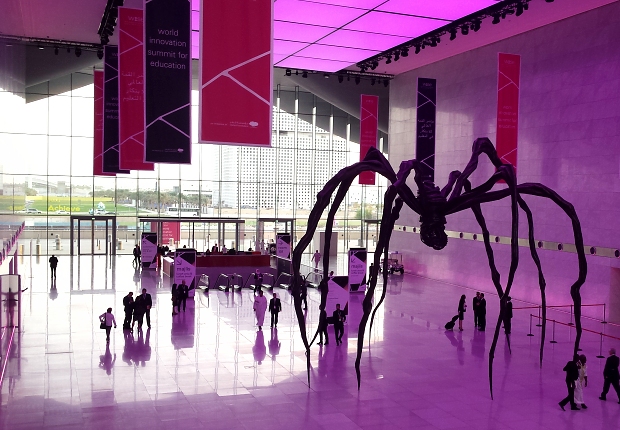This week I have been at the World Innovation Summit for Education (WISE), in Doha, Qatar, where the theme was ‘Imagine – Create – Learn: Creativity at the Heart of Education’. WISE is supported by the Qatar Foundation, which means they are able to direct considerable resources to organising a very big but pleasant and well-organised event which draws in tip-top expertise and brilliant practitioners from all around the world.
The core questions for the summit were:
→ How do we nurture creativity at all ages?
→ How do we design an environment of engaging pedagogies where creative learning and innovative teaching can blossom?
→ How do we measure, assess and certify talents and skills in both formal and informal systems?
Qatar may not be the most liberal culture in the world, but at WISE there was a strong emphasis on addressing inequalities of access to education and creative learning, certainly for the economically deprived, and for girls. A highlight of the conference was the powerful, moving speech by Ann Cotton, founder of Camfed, who was awarded the 2014 WISE Prize for Education. Camfed ‘tackles poverty and inequality by supporting marginalised girls to go to school and succeed, and empowering young women to step up as leaders of change’ (Camfed website). She received a standing ovation.
My session was about play, and I sought to argue:
→ Play is important for creativity and learning, for children and for everybody. If we want schools to embrace play more within their everyday practices, then we need to be somewhat more playful in adult life as well. Otherwise it doesn’t look like we really mean it. Adults being more playful does not necessarily mean we have to play in exactly the same way that children play. In fact, adults are already playful in ways that we don’t necessarily label as play – good-natured joking and silliness; making things in a freestyle way; mucking about; storytelling; trying things out without knowing whether or not they are going to work; as well as the play that we do with our children. Getting adults to be more playful is easier said than done, so we need leadership, and role models, and there’s a kind of design challenge to produce tools and environments that might prompt adults to be more playful.
→ Playful making connects you with the world. Creative making activities are vital aspects of play. As I argued in Making is Connecting, making things connects us with other people, and because through making things together, we increase our engagement with the world, and our sense of connection with our social and physical environments. Playful making, which is about the process rather than achieving particular goals, is especially valuable for this. And building people’s creative capacities is absolutely vital to the health of our societies.
→ We need to enable people to take small steps into a more playful world. We only need small bursts of playful activity to experience the power of play. After a certain age – which we see coming down all the time, as even some nurseries are organised like traditional schools – playful activity is mostly blocked out of people’s lives. But you only need short experiences of the ways in which play can connect people, and generate new ideas or feelings, to help you realise its value and seek to build playful opportunities in life.
I also noted that even if we can’t get rid of all the testing that happens in schools, we could at least have tests which look for creative problem-solving capacities and imagination, rather than learned facts.
I made a short video at the Summit, which you can see below. In the first couple of minutes I talk about play, and in the second two minutes I talk about a few Champions of the Ashoka / LEGO Foundation Re-Imagine Learning Challenge.
It was really nice to be a judge on the Re-Imagine Learning Challenge because I learned about so many brilliant projects. From over 630 entries from around the world we finally arrived at ten Champions:
→ Creative Classrooms Through Empowered Teachers (United States / Global)
→ Collège Catts Pressoir (Haiti)
→ Design for Change (India / Global)
→ Dream a Dream (India / Global)
→ Fabretto Children’s Foundation (Nicaragua)
→ Global Cardboard Challenge: Imagination Foundation (United States / Global)
→ Lively Minds: Community-Run Play Centres (Uganda / Ghana)
→ PUPA Early Childhood Development (Brazil)
→ Skateistan (Afghanistan / Cambodia / South Africa)
→ WASH (Water, Sanitation and Hygiene) United (Kenya)
These are all outstanding, innovative projects and it was a real privilege to get to know about them – and it will be great to meet people from them all at the April 2015 LEGO Idea conference.








Leave a Reply